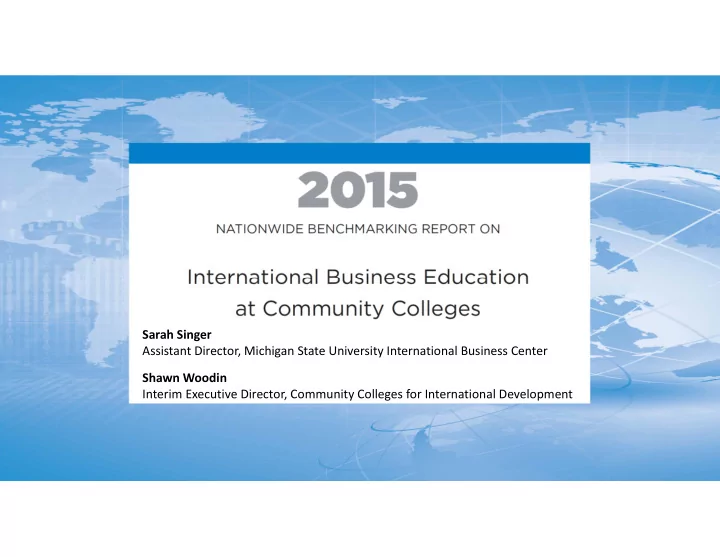

Sarah Singer Assistant Director, Michigan State University International Business Center Shawn Woodin Interim Executive Director, Community Colleges for International Development
Co lla b o ra tio ns a nd Multiplie r E ffe c ts • Co mmunity Co lle g e s fo r I nte rna tio na l De ve lo pme nt (CCI D): www.c c idinc .o rg • Na tio na l Asso c ia tio n fo r Co mmunity Co lle g e E ntre pre ne urship (NACCE ): www.na c c e .c o m • L e a g ue fo r I nno va tio n in the Co mmunity Co lle g e : www.le a g ue .o rg / i2015 • Ame ric a n Asso c ia tio n o f Co mmunity Co lle g e s (AACC): www.a a c c .nc he .e de • Mic hig a n Co mmunity Co lle g e Asso c ia tio n (MCCA): www.mc c a .o rg • L a nsing Co mmunity Co lle g e (L CC): www.lc c .e du • NASBI T E I nte rna tio na l: www.na sb ite .o rg • US De pa rtme nt o f E duc a tio n-funde d Ce nte rs fo r I nte rna tio na l Busine ss E duc a tio n a nd Re se a rc h: c ibe rwe b .msu.e du
I B I s a Wo rkfo rc e De ve lo pme nt T o o l Daniel, S. J., Xie, F., & Kedia, B. “2014 U.S. Business Needs for Employees with International Expertise.” In Internationalization of U.S. Education in the 21 st Century: The Future of International and Foreign Language Studies Conference. The College of William and Mary, 2014. http://www.wm.edu/offices/revescenter/internationalization/papers%20and%20presentations/danielkediafull.pdf
2014 U.S. Busine ss Ne e ds Surve y • 80% believe their business would increase if more staff had international expertise • 39% have failed to fully exploit an international opportunity because of insufficient expertise on staff • Most important skills: • Appreciation for cross cultural differences • Understanding of country legal/govt requirements • Understanding of local markets/business practices • Understanding of global economic connectedness
I mpo rta nc e o f I nte rna tio na l Busine ss F o r c o mmunity c o lle g e s this me a ns to a ddre ss two q ue stio ns: • Ho w inte rna tio na l b usine ss-o rie nte d is the se rving a re a / po pula tio n o f the c o mmunity c o lle g e ? • Ho w inte rna tio na l b usine ss-o rie nte d sho uld the c o mmunity c o lle g e ’ s stra te g y b e ?
T he Co untry ha s 1,132 Co mmunity Co lle g e s
23.9% In percent of the total, how much of your 15.9% Community College's programs were international 5 years ago? Today? In 5 years? In 10 years? 8.4% 4.5% 2009 2014 2019 2024
Growing? Growing - International Business: 24 percent - International Studies: 25 percent Stagnant - International Business: 36 percent - International Studies: 38 percent Declining - International Business: 11 percent - International Studies: 3 percent Not Offered - International Business: 29 percent - International Studies: 33 percent
Program Funding Offerings 0.67 Organizational 0.72 Infrastructure IBEX Strategic 0.56 Commitment Investment 0.68 in Faculty 0.74
Program Funding Offerings 0.30 Organizational 0.54 IEX Infrastructure Strategic 0.38 Commitment Investment 0.52 in Faculty 0.31
IEX= IEX= IEX= 0.47 0.38 0.36 IEX=0.40 IEX Overall=0.41
Local and Regional Business Faculty and Community Colleges Faculty Community Community Members People in People the Country Business Students at Community Colleges Students Administrators at Administrators Community Colleges
Desired (2024) Present (2014) 100% Teaching 71% Teaching International Business International Business
All Courses with an Business 12% 14% Courses international focus Courses 2.9% Budget spent on 6.2% Business All international programs Programs Programs Students transferring 35% 38% Business All to 4-year schools Students Students Business Foreign 3.5% 28 Courses Students Offered 33% Globally Engaged Companies in Your Region
Community Colleges for International Development, Inc. Community College Student Internationalization Experience Survey Partner CCID Find What are the relationships between internationalization activities and learning outcomes? Is your college investing global education resources in a manner that impacts student outcomes?
Recommend
More recommend